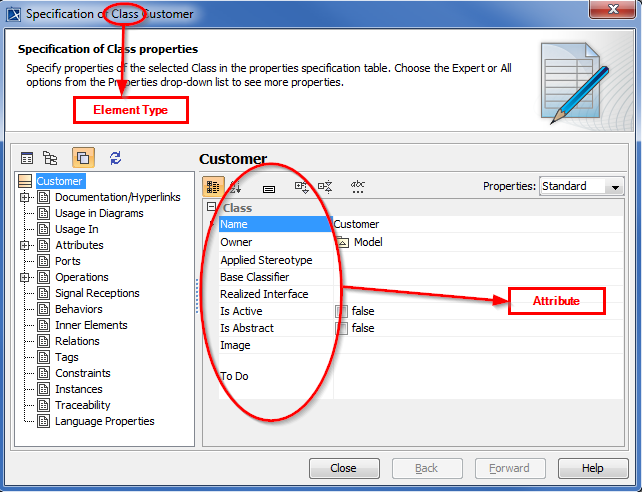
Class Diagram: Customer.
The variables imported to the template are collected by the type of element selected in the package scope. Use the fourth step in the Report Wizard dialog to select the package scope. In this example, we take a class diagram with the class name Customer, see the figure below, to print it in a report.

To print attributes of the Customer class in a report

With the following VTL code, you can print the attributes of the Class element:
#foreach ($class in $Class) Name: $class.name Owner: $class.owner.name Visibility: $class.visibility Is Abstract: $class.isAbstract #end |
The output will be as follows:
Name: Customer Owner: com Visibility: public Is Abstract: false |
The table below gives and explains the additional properties which are not part of the UML specifications, but retrievable by Report Wizard.
| Element Owner | Property Name | Function |
|---|---|---|
| Diagram | image | To return the diagram’s image. |
| Diagram | diagramType | To return the diagram’s type. |
| Element | image | To generate the element’s image or to print an empty text if the element does not refer to any diagram. |
| Element | elementType | To return a name of an element’s type
|
| Element | humanName | To return an element’s human readable name, which is a string concatenation between the human element type and the element’s name. |
| Element | humanType | To return an element’s type in a human readable format. |
| Element | appliedStereotype | To return an applied stereotype of an element. |
| Element | activeHyperlink | To return an active hyperlink of an element. |
| Element | hyperlinks | To return all hyperlinks attached to an element. |
| Element | toDo | To return an element’s ToDo attribute in text format. |
| Element | elementID | To return an element’s ID. |
| Element | documentation | To return an element’s comment/documentation. |
| Element | presentation | Element To return a presentation element. |
| Element | typeModifier | To return an element’s type modifier. |
| Element | tags | To return a list of element tags. |
| Element | text | To return a text representation RepresentationTextCreator.getRepresentedText(Element element) |
| Element | slots | To return a list of element’s slots. |
| Element | elementURL | To return an element’s URL. |
| Classifier | baseClassifier | To return a base classifier of an element. |
| BehavioredClassifier | realizedInterface | To return a Classifier’s Realized Interface. |
| Package | appliedProfile | To return a list of profiles applied to a package. |
| Stereotype | metaClass | To return a Meta Class of a stereotype. |
| DurationConstraint | min | To return a minimum value of the Duration Constraint. |
| DurationConstraint | max | To return a maximum value of the Duration Constraint. |
| TimeConstraint | min | To return a minimum value of the Time Constraint. |
| TimeConstraint | max | To return a maximum value of the Time Constraint. |
| MultiplicityElement | multiplicity | To return a multiplicity value. |
| Property | navigable | To return a navigable value. |
| Property | ownedBy | To return a property’s owner. |
| Lifeline | type | To return a lifeline type. |
| Message | event | To return a message event. |
| Message | operation | To return a message operation. |
| Message | signal | To return a message signal. |
| Message | number | To return a message number. |
| Trigger | eventType | To trigger an event type. |
| RequirementsUseCase | number | To return a use case number. |
Some predefined variables, which are not part of the UML specifications, are usable in the templates:
humanName and humanType are locale-specific text. If you plan to generate a report in different languages, try to avoid humanType and humanName. Instead, use elementType for a non-locale-specific report. |